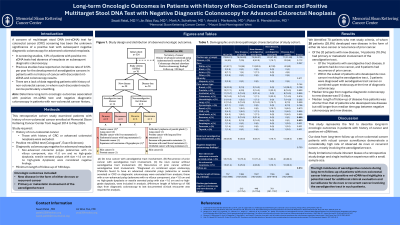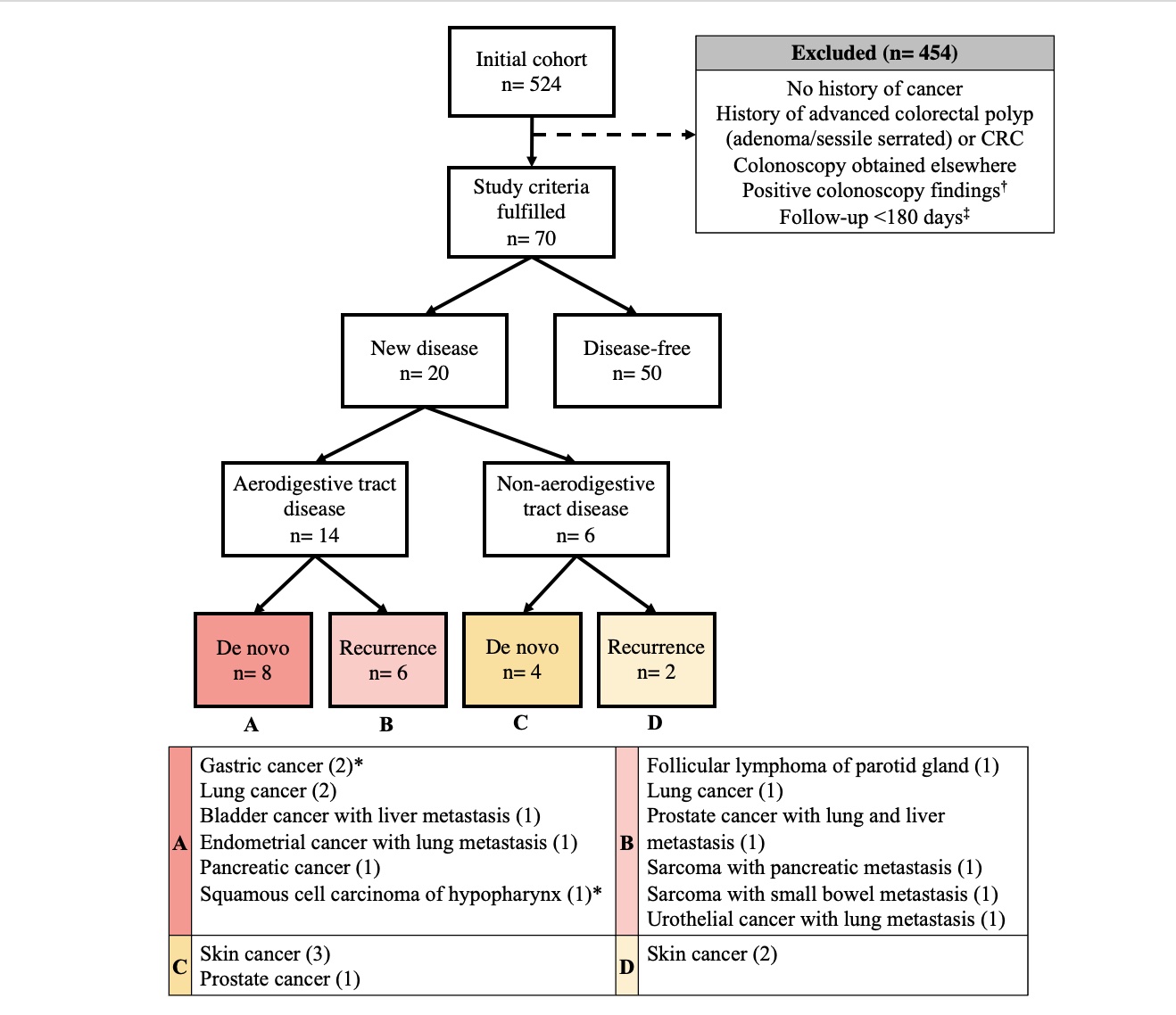Monday Poster Session
Category: Colorectal Cancer Prevention
P2124 - Long-Term Oncologic Outcomes in Patients With History of Non-Colorectal Cancer and Positive Multi-Target Stool DNA Test With Negative Diagnostic Colonoscopy for Advanced Colorectal Neoplasia
Monday, October 28, 2024
10:30 AM - 4:00 PM ET
Location: Exhibit Hall E

Has Audio
.jpg)
Swati Patel, MD
Mount Sinai Morningside/West, Icahn School of Medicine at Mount Sinai
New York, NY
Presenting Author(s)
Award: Presidential Poster Award
Swati Patel, MD1, Jin Woo Yoo, MD2, Mark A. Schattner, MD2, Arnold J. Markowitz, MD2, Robin B. Mendelsohn, MD2
1Mount Sinai Morningside/West, Icahn School of Medicine at Mount Sinai, New York, NY; 2Memorial Sloan Kettering Cancer Center, New York, NY
Introduction: A concern of multitarget stool DNA (mt-sDNA) test for colorectal cancer (CRC) screening has been the unknown significance of a positive test with subsequent negative diagnostic colonoscopy for advanced colorectal neoplasia. Such discordant results can be particularly unsettling for patients with cancer history given the theoretical possibility of excretion of abnormal DNA markers into the aerodigestive tract by extra-colonic neoplasms. We aimed to describe long-term oncologic outcomes associated with positive mt-sDNA test and negative diagnostic colonoscopy in patients with non-colorectal cancer history.
Methods: We performed a retrospective cohort study of patients with history of non-colorectal cancer and positive mt-sDNA test (Cologuard®, Exact Sciences) who had a negative diagnostic colonoscopy for advanced colorectal neoplasia at Memorial Sloan Kettering Cancer Center from August 2014 to May 2024, with a minimum length of follow-up of 180 days (d). Outcomes included interval development of cancer (new disease) with or without aerodigestive tract involvement.
Results: We identified 70 patients who met study criteria, of whom 20 patients (28.6%) developed new disease in the form of either de novo cancer or recurrence of prior cancer. Of the 20 patients with new disease, 14 patients (70%) had primary or metastatic involvement of the aerodigestive tract, including 8 patients with de novo cancer and 6 patients with recurrence of prior cancer. Of the 8 patients who developed de novo cancer involving the aerodigestive tract, 3 patients were diagnosed with aerodigestive tract cancer on combined upper endoscopy at the time of diagnostic colonoscopy. Median length of follow-up was 757 d (range, 182-2994 d). Median time gap from negative diagnostic colonoscopy to new disease was 513 d (range, 0- 1754 d).
Discussion: Data from this long-term oncologic follow-up of patients with history of non-colorectal cancer and positive mt-sDNA test with negative diagnostic colonoscopy demonstrate a considerably high rate of observed de novo or recurrent cancer, mostly involving the aerodigestive tract. While limited by retrospective study design and single institution experience, these results suggest a potential need for additional clinical evaluation in such patients with non-colorectal cancer history.

Note: The table for this abstract can be viewed in the ePoster Gallery section of the ACG 2024 ePoster Site or in The American Journal of Gastroenterology's abstract supplement issue, both of which will be available starting October 27, 2024.
Disclosures:
Swati Patel, MD1, Jin Woo Yoo, MD2, Mark A. Schattner, MD2, Arnold J. Markowitz, MD2, Robin B. Mendelsohn, MD2. P2124 - Long-Term Oncologic Outcomes in Patients With History of Non-Colorectal Cancer and Positive Multi-Target Stool DNA Test With Negative Diagnostic Colonoscopy for Advanced Colorectal Neoplasia, ACG 2024 Annual Scientific Meeting Abstracts. Philadelphia, PA: American College of Gastroenterology.
Swati Patel, MD1, Jin Woo Yoo, MD2, Mark A. Schattner, MD2, Arnold J. Markowitz, MD2, Robin B. Mendelsohn, MD2
1Mount Sinai Morningside/West, Icahn School of Medicine at Mount Sinai, New York, NY; 2Memorial Sloan Kettering Cancer Center, New York, NY
Introduction: A concern of multitarget stool DNA (mt-sDNA) test for colorectal cancer (CRC) screening has been the unknown significance of a positive test with subsequent negative diagnostic colonoscopy for advanced colorectal neoplasia. Such discordant results can be particularly unsettling for patients with cancer history given the theoretical possibility of excretion of abnormal DNA markers into the aerodigestive tract by extra-colonic neoplasms. We aimed to describe long-term oncologic outcomes associated with positive mt-sDNA test and negative diagnostic colonoscopy in patients with non-colorectal cancer history.
Methods: We performed a retrospective cohort study of patients with history of non-colorectal cancer and positive mt-sDNA test (Cologuard®, Exact Sciences) who had a negative diagnostic colonoscopy for advanced colorectal neoplasia at Memorial Sloan Kettering Cancer Center from August 2014 to May 2024, with a minimum length of follow-up of 180 days (d). Outcomes included interval development of cancer (new disease) with or without aerodigestive tract involvement.
Results: We identified 70 patients who met study criteria, of whom 20 patients (28.6%) developed new disease in the form of either de novo cancer or recurrence of prior cancer. Of the 20 patients with new disease, 14 patients (70%) had primary or metastatic involvement of the aerodigestive tract, including 8 patients with de novo cancer and 6 patients with recurrence of prior cancer. Of the 8 patients who developed de novo cancer involving the aerodigestive tract, 3 patients were diagnosed with aerodigestive tract cancer on combined upper endoscopy at the time of diagnostic colonoscopy. Median length of follow-up was 757 d (range, 182-2994 d). Median time gap from negative diagnostic colonoscopy to new disease was 513 d (range, 0- 1754 d).
Discussion: Data from this long-term oncologic follow-up of patients with history of non-colorectal cancer and positive mt-sDNA test with negative diagnostic colonoscopy demonstrate a considerably high rate of observed de novo or recurrent cancer, mostly involving the aerodigestive tract. While limited by retrospective study design and single institution experience, these results suggest a potential need for additional clinical evaluation in such patients with non-colorectal cancer history.

Figure: Initial cohort of 524 patients was identified per automated query of electronic medical records at Memorial Sloan Kettering Cancer Center from August 2014 to May 2024, which were manually reviewed to ensure study criteria fulfillment for a final cohort of 70 patients who were included in analysis. CRC, colorectal cancer. Oncologic outcomes were assessed for the development of new disease in the form of either de novo or recurrent cancer with or without aerodigestive tract involvement. (A) De novo cancer with aerodigestive tract involvement. (B) Recurrence of prior cancer with aerodigestive tract involvement. (C) De novo cancer without aerodigestive tract involvement. (D) Recurrence of prior cancer without aerodigestive tract involvement. *Diagnosed on combined upper endoscopy at the time of diagnostic colonoscopy. †Patients found to have an advanced colorectal polyp (adenoma or sessile serrated) or CRC on diagnostic colonoscopy were excluded from analysis; those with a non-advanced polyp (adenoma with no villous component, size <1.0 cm and no dysplasia or sessile serrated polyp with size <1.0 cm and no dysplasia, were included in analysis. ‡Minimum length of follow-up of 180 days from diagnostic colonoscopy to last documented clinical encounter was required for analysis.
Note: The table for this abstract can be viewed in the ePoster Gallery section of the ACG 2024 ePoster Site or in The American Journal of Gastroenterology's abstract supplement issue, both of which will be available starting October 27, 2024.
Disclosures:
Swati Patel indicated no relevant financial relationships.
Jin Woo Yoo indicated no relevant financial relationships.
Mark A. Schattner indicated no relevant financial relationships.
Arnold J. Markowitz indicated no relevant financial relationships.
Robin B. Mendelsohn indicated no relevant financial relationships.
Swati Patel, MD1, Jin Woo Yoo, MD2, Mark A. Schattner, MD2, Arnold J. Markowitz, MD2, Robin B. Mendelsohn, MD2. P2124 - Long-Term Oncologic Outcomes in Patients With History of Non-Colorectal Cancer and Positive Multi-Target Stool DNA Test With Negative Diagnostic Colonoscopy for Advanced Colorectal Neoplasia, ACG 2024 Annual Scientific Meeting Abstracts. Philadelphia, PA: American College of Gastroenterology.

